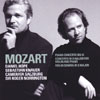Mozart Piano Concerto No 16; Concerto for Violin and Piano
Two soloists demonstrate their rapport in a reconstructed Mozart rarity
View record and artist detailsRecord and Artist Details
Composer or Director: Wolfgang Amadeus Mozart
Genre:
Orchestral
Label: Warner Classics
Magazine Review Date: 6/2005
Media Format: CD or Download
Media Runtime: 71
Mastering:
Stereo
DDD
Catalogue Number: 2564 61944-2

Tracks:
| Composition | Artist Credit |
|---|---|
| Concerto for Piano and Orchestra No. 16 |
Wolfgang Amadeus Mozart, Composer
Roger Norrington, Conductor Salzburg Camerata Sebastian Knauer, Piano Wolfgang Amadeus Mozart, Composer |
| Sonata for Keyboard and Violin No. 27 |
Wolfgang Amadeus Mozart, Composer
Daniel Hope, Violin Sebastian Knauer, Piano Wolfgang Amadeus Mozart, Composer |
| Concerto for Violin, Piano and Orchestra |
Wolfgang Amadeus Mozart, Composer
Daniel Hope, Violin Roger Norrington, Conductor Salzburg Camerata Sebastian Knauer, Piano Wolfgang Amadeus Mozart, Composer |
Author: Nalen Anthoni
Whatever you feel about the result, Philip Wilby’s reconstruction of the Double Concerto, KAnh56, is a significant attraction. He has put together a work Mozart began in 1778 but abandoned after 120 bars. It is scored for a big orchestra that excludes clarinets and, unusually, bassoons. Uncharacteristically, though, Norrington subdues the trumpets and timpani until he approaches the end. He also tends to treat the second violins as an accompanying murmuring line rather than an incisive force. But Norrington ‘improves’ on Wilby in the slow movement where he discerningly adds oboes to bars 59 and 60 (5’01”-5’07”) thus filling in bare areas.
Hope and Knauer have the requisite artistic rapport to deal with their interweaving parts and to draw out the jest in Mozart’s own cadenza to the finale, a 47-bar section in 4/4 within a movement that alternates between 2/4 and 6/8. They both come into their own in the Sonata, rightly treated as a work for piano and violin: Variation 5 of the slow movement exemplifies Knauer’s strongly voiced yet considerate playing and Hope’s ability to create expressive pizzicati as easily as he bows a singing sequence.
The D major Concerto, No 16, also for large band, is something of a Cinderella but here achieves the status it deserves. Now Norrington gives the players their head; ringing brass, militant drums and defined woodwind set their seal from the beginning. Nearly 60 years ago Arthur Hutchings deplored the ‘languor’ of the slow movement and thought the last ‘trivial’. Today he’d probably eat his words as Knauer (who plays Mozart’s cadenzas) and Norrington find no languor in an ideally paced Andantino, nor a trivial outlook in a deftly accented, dynamic finale that finishes in swinging compound time. This carefully balanced and tonally excellent disc is most desirable.
Hope and Knauer have the requisite artistic rapport to deal with their interweaving parts and to draw out the jest in Mozart’s own cadenza to the finale, a 47-bar section in 4/4 within a movement that alternates between 2/4 and 6/8. They both come into their own in the Sonata, rightly treated as a work for piano and violin: Variation 5 of the slow movement exemplifies Knauer’s strongly voiced yet considerate playing and Hope’s ability to create expressive pizzicati as easily as he bows a singing sequence.
The D major Concerto, No 16, also for large band, is something of a Cinderella but here achieves the status it deserves. Now Norrington gives the players their head; ringing brass, militant drums and defined woodwind set their seal from the beginning. Nearly 60 years ago Arthur Hutchings deplored the ‘languor’ of the slow movement and thought the last ‘trivial’. Today he’d probably eat his words as Knauer (who plays Mozart’s cadenzas) and Norrington find no languor in an ideally paced Andantino, nor a trivial outlook in a deftly accented, dynamic finale that finishes in swinging compound time. This carefully balanced and tonally excellent disc is most desirable.
Discover the world's largest classical music catalogue with Presto Music.

Gramophone Digital Club
- Digital Edition
- Digital Archive
- Reviews Database
- Full website access
From £8.75 / month
Subscribe
Gramophone Full Club
- Print Edition
- Digital Edition
- Digital Archive
- Reviews Database
- Full website access
From £11.00 / month
Subscribe
If you are a library, university or other organisation that would be interested in an institutional subscription to Gramophone please click here for further information.




